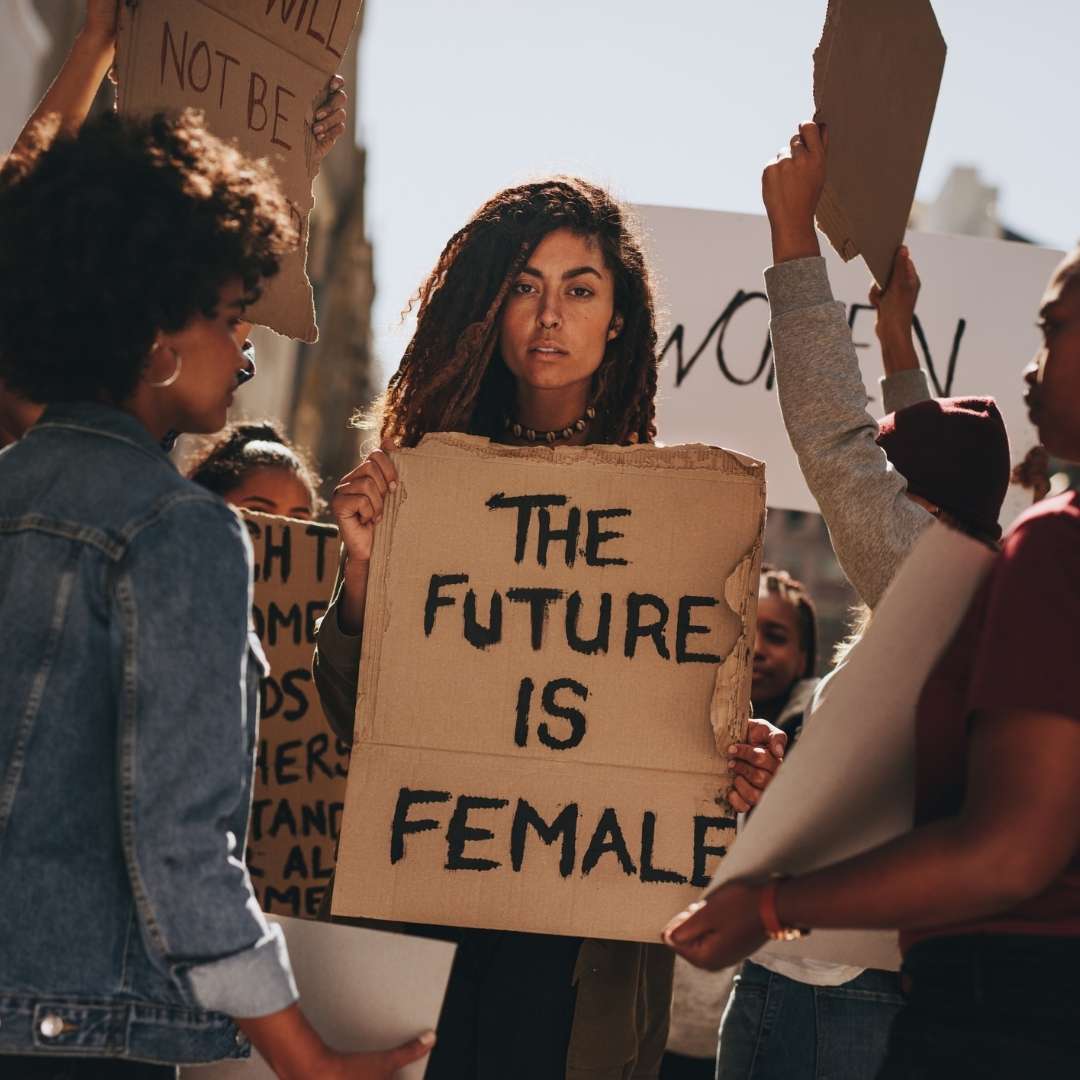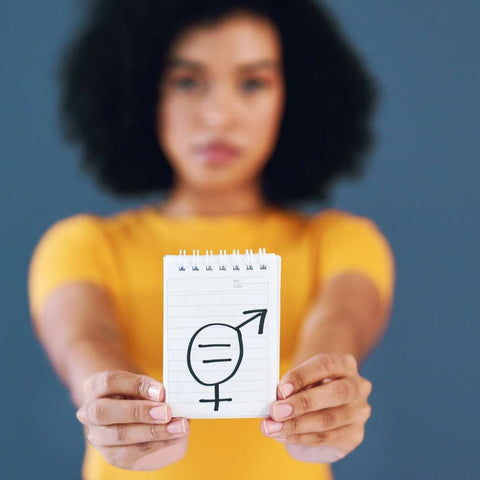
5 reasons to do something for women's rights on International Women's Day
Share
Am 8. March 2022 is International Women's Day again and it is not for nothing that women's struggle day is also spoken of. So get out your comfortable shoes, make a poster and throw yourself into something purple, because there will be a demonstration for women's rights!
Anyone who now thinks: "I actually already have all the rights I need. What should I write on my poster?", we were happy to give him a few good reasons to take to the streets after all. We would also be happy to provide the right slogans to get you in the right mood.

Why is there International Women's Day?
"Clara Zetkin already knew: without a fight there is no higher reward!"
We have a very special woman to thank for that and if we don't do anything else on International Women's Day, then at least that. Because there really aren't enough female historical figures who are well-known and duly celebrated! It's about Clara Zetkin, a socialist who campaigned primarily for the rights of workers. She seems to have been one of those people whose bios make you wonder when they slept and whose bios make you rethink your own Netflix consumption. Whether women's suffrage, fair wages, improvement of working conditions, she campaigned for everything that should improve life, especially that of women*. Among other things, for International Women's Day, which took place for the first time in 1911.

What is International Women's Day celebrated for?
The UN proclaims a motto for International Women's Day every year, this year it's #breakthebias, which is about acting in a more inclusive and non-judgmental manner. That's important because, as we'll see, "gender bias" is the handbrake on a woman's life*.
But actually, the topics at the demos on International Women's Day are unfortunately repeated year after year like a mantra, because things are progressing very slowly. And Corona cheated us and even set us back, UN Women is not talking about one for nothing "Women's Crisis". The World Economic Forum (WEF) calculates annually in its "Gender Gap Report"how long equality for women* in business and politics will last. While it was "only" 99.5 years in 2020, another generation of women* still has to wait, because now it's 135.6 years. If climate change and/or Corona or another epidemic don't wipe us out, our children's children may have a very good hand.

5 Reasons Worth Fighting For On International Women's Day
We have 5 good reasons to take to the streets on International Women's Day on March 8 and demonstrate for women's rights. Here is an overview of the reasons:
1. Physical and sexual violence
2. Femicide
3. Sexual self-determination
4. Equal rights on the labor market
5. Role thinking and gender bias
Sounds exciting and something worth taking to the streets for? Absolutely! It is. Let's jump straight into the details, the appropriate slogans come with it!

1. Physical and sexualized violence
The right slogan that you can yell into the megaphone:
"However I dress, wherever I go - Yes means Yes, No means No"
Consensus still seems very confusing for many and it is predominantly women* who are affected by sexualized violence. The term Rape Culture describes our society, in which this sexualized violence is often normalized and played down.
In Germany, every third woman* is a victim of physical or sexual violence at least once in her life. And it is usually not the "evil stranger" but someone from their own social environment. And that's what makes it so difficult. For example, every fourth woman in Germany is "victim of physical or sexual violence at least once by her current or former partner". Unfortunately, our handbags filled with whistles, pepper sprays or the key clamped in our fists only help us to a limited extent, as do all the self-defence courses that we complete.
"Violence against women* is not an isolated case - fight sexism everywhere"
More and more social media campaigns make the (sexualized) violence against women* visible: #metoo, @everydaysexism, #textmewhenyougethome, or #ichhabnichtananzeige. Last there was at the murder Sarah Everard and the accompanying vigil created an international outcry under #reclaimthestreets as women* were urged to stay home to be safe following the disappearance of Sarah Everard. This anchoring of responsibility among women*: "Don't dress provocatively, don't go home alone" all have the tenor of "Your own fault" if something happens. And as a result, we are massively restricted in our freedom of movement, but we are often not even aware of it. For example, what man* plans circuitous routes home to avoid lonely or poorly lit places? Doesn't take his eyes off his drink for a second so nobody can mix knockout drops in it? Or changes the side of the street or the compartment because he feels uncomfortable? Let's put responsibility back where it belongs to the perpetrators* and thus to men* in general, because violence does not just happen to women*, it is perpetrated by someone, let's start with that.

2. Femicides
"Against sexism in any form - no tolerance of male violence"
Femicide is an extreme form of violence against women*. It is the murder of women* because they are women*. A claim of ownership is asserted. Anyone who finds this confusing and wonders whether something like this happens will certainly know newspaper reports where there is talk of "relationship drama" and where the partner or ex-partner has killed his partner. This often happens when the woman* wants or has left her partner. For example, in 2020, 119,164 women were affected by intimate partner violence and 139 ended it deadly. Every third day a woman* in Germany is killed by her partner or ex-partner. Compounding the problem is that these murders are not categorized as "femicides." It starts with reporting and ends with crime statistics. But unless we label them "femicides," they're invisible and don't get the attention he needs to do anything about it.

3. sexual self-determination
"My body, my choice"
The sexual self-determination of women* was and is certainly one of the most important steps. As always, it's about a whole range of topics: how free are women* to decide with whom they have sex? You shouldn't be forced to have sex, one could naively say. But a court ruling from France shows how far we still have to go. There, a woman was found guilty of divorcing her abusive husband because she "marital duties" didn't keep up.
But the fact that women* cannot make decisions about their own bodies is nothing new. Abortion is still a part of this, and this is something that is being questioned again and again. And the associated family planning, i.e. whether to have children, when and how many. You could assume that women* or couples can decide for themselves, but that's not always the case. The pressure on women* to have children is still very high. We know that not only since the book "If being a mother doesn't make you happy" by Christina Mundlos, who shed light on the #regrettingmotherhood phenomenon. In addition, when it comes to family planning and pregnancy, the responsibility usually lies with the woman*. For example, when it comes to contraception, and they* usually have to pay for this out of their own pockets, which not everyone* can afford. In other countries this is part of the general health care, just like the termination of pregnancy and not a "private luxury" that one or rather woman has to pay for their sex life.

4. Equality in the labor market
"Fair wages - for all of us. Away with the part-time trap"
Things are not looking particularly rosy for women* on the labor market either. On average, women* earn less than men*, the so-called "gender pay gap", they are more often employed part-time or marginally employed because they take on other tasks in the care of children and relatives and are also much less likely to be in management positions. All of this means that women* are affected by the "gender pension gap" in old age, i.e. they receive a lower pension. As a result, they are more likely to be affected by poverty in old age. If you want to know more about this, please visit the blog Equal Pay Day browse.

5. Role thinking and gender bias
"You can give yourself the mackerel! Against all role thinking!"
Many threads of structural inequality come together here, which is why this year's motto of the UN is quite sensible. Because it is of course the case that many of these inequalities can be traced back to our understanding of roles. Certain characteristics are ascribed to women* and men* and a value is then attached to them, although unfortunately it is usually the case that male characteristics* are rated more positively than female* characteristics.
"Your kids will be like us - your kids will all be queer!"
This is frustrating on many levels: everyone finds themselves in a tight corset of expectations associated with their gender, even though this often does not correspond to their own identity. It also makes it very difficult to exist beyond this binary gender order, e.g. not identifying with either gender and/or being between them. We have experienced this enough in the tiresome debates about the third gender, toilets and gender-appropriate language. And because of this understanding of roles, there is also a power imbalance: there is the "man", who is equated with "man" and thus becomes the norm, and the "opposite sex", as Simone de Beauvoir put it so wonderfully aptly.
This leads to gender biases, i.e. gender-related distortion effects. Our assumptions, stereotypes and prejudices related to gender play a role in this. There is a nice article on how this affects working life here and in research here. And if you want to get the full blast of how women* live in a world that isn't made for them, I warmly recommend "Invisible Women" by Caroline Criado-Perez. I cannot praise this book highly enough because it is so packed with information and so well researched that even a doubter would be instantly converted and put on an "I am a feminist" button.
"What really pisses us off? Division into woman and man"
But power relations also have an effect on relationships, on togetherness. If women* are not whole people or simply less, then you can do completely different things with them. This shows up in sexual assault or femicide as much as it does in legislation: changing the law to what Rape in marriage is a criminal offence is was not changed until the late 1990s, for example.
"If a woman wants, everything stands still"
By the way, when it comes to gender equality, Germany ranks 11th out of 107. Iceland is number 1, which points to a very special day, the "Women's Day of Rest" on April 24th. October 1975. On this day, all women* went on strike and stopped their jobs (paid and unpaid). So demos can be quite successful. The women* strike is now also taking place in other countries, for example in our neighbour, Switzerland, and is also being discussed by some organizations in this country. Which is also a wonderful lead-in to our next topic.

International women's rights
"Solidarity means resistance. Fight sexism in every country"
On International Women's Day, women* all over the world show solidarity. This is definitely necessary. Just look at Turkey, which has dropped out of the Istanbul Convention to prevent and combat violence against women, at Afghanistan, where the Taliban have wasted no time in massively restricting women's rights, or at Texas, where women* can have abortions by changing the law is made almost impossible.
Anyone who is already excited about the 8th March marked in red in his calendar, he/she should be told that International Women's Day was only chosen as a public holiday in Berlin and Mecklenburg-Western Pomerania. This is perhaps another reason to take to the streets. But actually there are enough reasons to do something for women's rights on International Women's Day and not just accept roses frugally or turn it into a wellness day with your girls. 136 years for gender equality is a damn long time and it is up to all of us to do something to make it less, because:
"Women* who fight are women* who live - let's unhinge the system."













